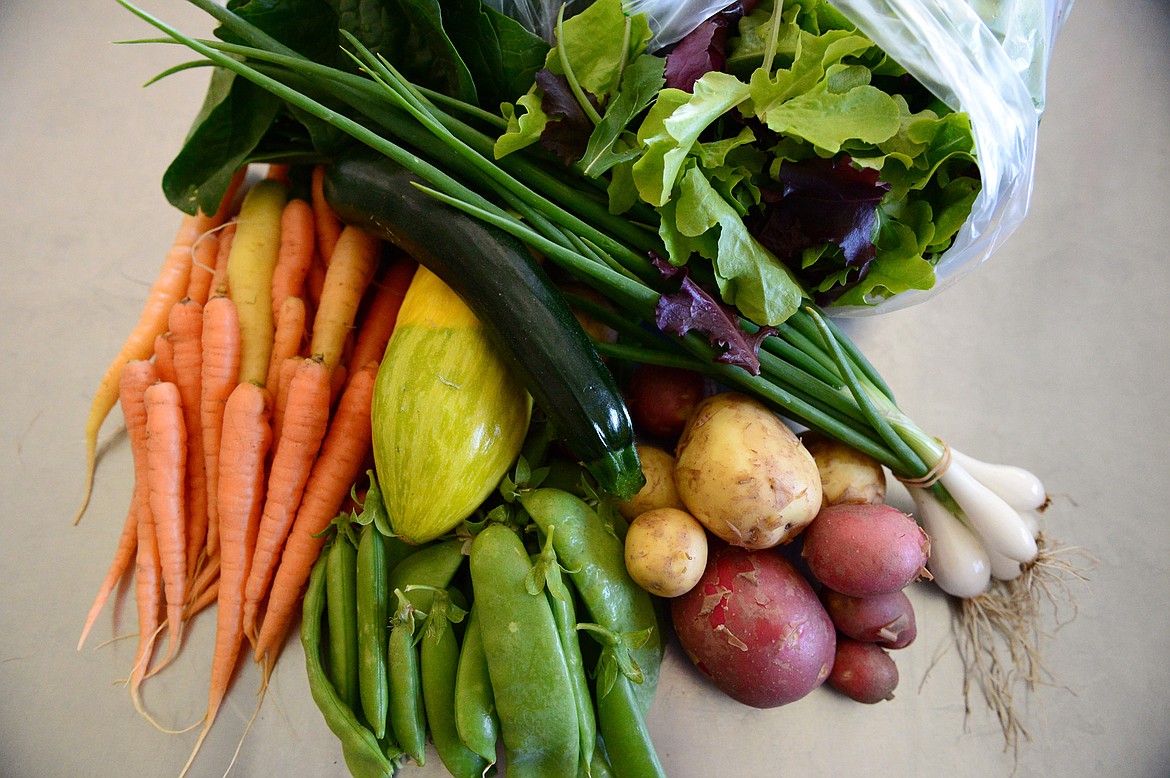Students, community find benefits at FVCC farm
While most college students spend the school year with their noses buried in books, some of the agriculture students, interns and volunteers at Flathead Valley Community College get more hands-on homework.
They spend their spring and summer days plucking weeds from the wheat fields and planting fresh beds of lettuce on the 7-acre farm owned by the college, located off Hutton Ranch Drive.
Led by instructors with years of experience in both the field and the lab, students do much more than just planting and harvesting on the farm, however. They participate in every facet of production, from seed selection to pest control, according to professor and director of the college’s agriculture program, Heather Estrada.
“We’ve noticed over time ... that most of our students come here with a general interest in agriculture, but they aren’t really sure what they want to do,” Estrada said. “Our goal is to expose them to as many aspects of agriculture as we can.”
On the front end, they take part in budgeting, planning and marketing. On the back end, they participate in harvesting, evaluating and distributing. And along the way, they learn about soil management, crop yield and health, equipment management and maintenance, production and organic standards.
“There’s so much to learn,” said farm manager Julian Cunningham. “We really try to give students a whole picture.”
According to Cunningham, the farm produces a variety of around 30 different fruits and vegetables for a total of up to 10,000 pounds of produce a season, all of which is grown according to organic standards.
That produce gets divided up into around 25 shares and distributed to share holders weekly throughout the growing season.
The timing of the school semesters means the farm’s growing season tends to be about a month shorter than other farms that take part in crop sharing, costing each shareholder around $350 per season.
According to Estrada, most of the money made from the farm goes directly back to agriculture students in the form of scholarships, with some withheld to purchase new farm equipment.
“We try and focus on the education part rather than the business part of our farm,” Estrada said. “We have this working side … and then the educational side, so we try to balance those two things as best we can”
Though the farm’s main purpose is to act as a working laboratory for students, it fills multiple needs both for the college and the community.
Over 50 varieties of wheat and 20 varieties of dark fruit serve as part of different collaborative research projects to test them for different traits that will help local farmers improve and diversify their crops.
A joint effort with Montana State University, FVCC agriculture students and staff evaluate different varieties of honeyberries or haskaps, service berries or saskatoons, currants, chokecherries and more for their winter hardiness, yield capacity and antioxidant and sugar levels.
“The idea is that we are helping to expand the market, help farmers diversify what they’re producing,” Estrada said.
Using the farm as the grounds for such experiments allows the college to take part in the identification of new crops with the potential to thrive and flourish within the region.
The farm’s advisory board also includes several local farmers who give valuable input on the direction the farm should take in order to best educate students, as well as the best ways to positively impact the local farming industry through research.
Results of such projects could lead to advancements not only in the farming industry but also in the health and culinary fields, according to Estrada.
“I think it’s very important that we do both things, work for our students and also for the community,” she said.
Estrada said she sees high potential for the farm to impact other areas of the college as well, with food already being grown and given to the Eagle’s Nest Café on campus.
In the future, she hopes to be able to provide different fruits and berries for advanced baking and pastry students, a variety of produce for culinary students, fresh lunches for the early childhood center and eventually, malt barley and other grains for brewing science students.
“The more we diversify, we think, the more interest that creates and the more value it has for our students,” Estrada said.
“We’re always trying to grow and do different things and keep our finger on the pulse and really expand so that we can give our students who are out here a really broad experience.”
For more information about volunteering or enrolling in the FVCC agricultural program, visit https://www.fvcc.edu/programs/agriculture-natural-resources-forestry-brewing/agriculture/ or contact Estrada at 756-4182.
Reporter Mary Cloud Taylor can be reached at 758-4459 or mtaylor@dailyinterlake.com.

















